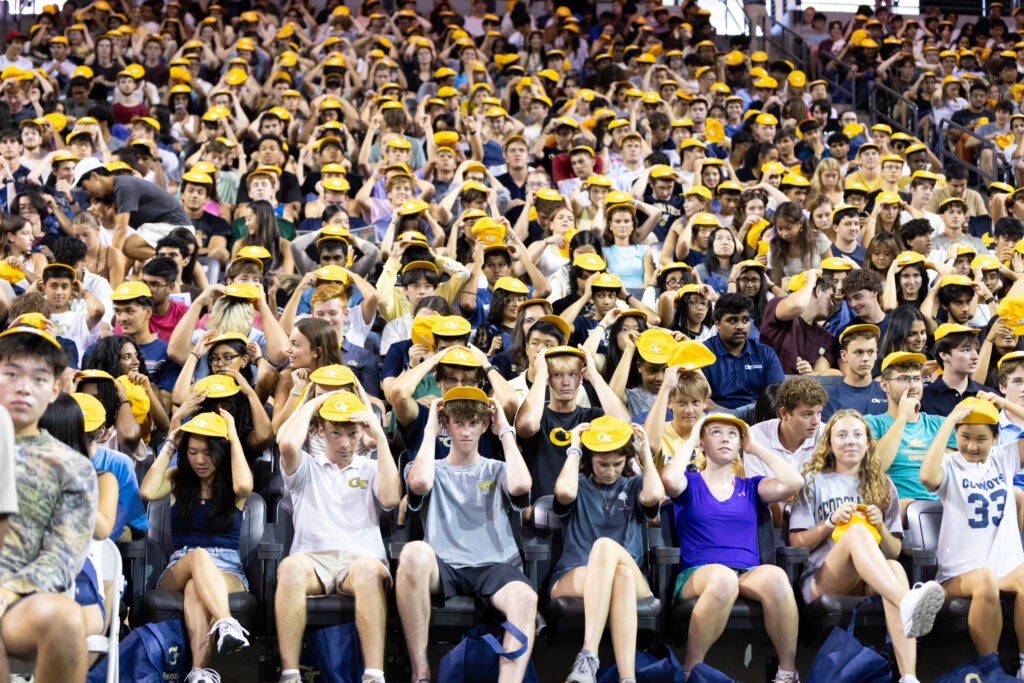Posted on 30 August 2024.

McCamish Pavilion was buzzing with nervous energy on Sunday, Aug. 18, before the Institute’s leaders took the stage to officially welcome thousands of new students to Tech.
President Ángel Cabrera and Undergraduate Student Body President Shivani Virani, fourth-year NEUR, spoke at the New Student Convocation, where incoming first years received their RAT caps and participated in several other Tech traditions.
After the convocation, T-Night, Tech’s annual transitions show hosted by the Ramblin’ Reck Club, was held in the same space. New students could play games and visit community booths in the McCamish parking lot between the two events.
New students started pouring into the venue when the doors opened at 3 p.m., an hour before the event. The earliest students got seats on the floor of McCamish, while the rest of the students filled roughly half of the remaining seats on the first floor of the pavilion.
Early students were treated to a pre-show that featured various organizations around the Institute, including dance group Qurbani at Tech and a showcase of several four-legged walking robots. Head Football Coach Brent Key kicked off the speaking engagements with an encouraging and fiery message, ending with a reminder to attend Jackets’ football games.
Head Basketball Coach Damon Stoudamire also spoke before Institute leaders assumed their positions on stage, delivering a much calmer message while still encouraging students to attend both basketball and volleyball games.
Then Institute leaders joined the stage, and President Cabrera introduced everyone on stage, including welcome speaker Jaila Kimbro, second-year CMPE.
Kimbro delivered a reassuring message to new students using a Rubik’s Cube to emphasize her point. Kimbro told students that it is normal not to find all the answers that one might be looking for in their first year and said that everyone was forging their path through life and solving their own puzzles.
Throughout the speech, Kimbro twisted and spun the Rubik’s Cube, but by the end of the speech, it was just as scrambled as it was at the beginning, and Kimbro admitted that she did not know how to solve a Rubik’s Cube but was she still working to find the solution; similarly, it is acceptable not to have all the answers in life, but it is important to work towards them.
Next, the Provost and Executive Vice President for Academic Affairs Steven McLaughlin took to the podium to reassure students and hundreds of parents on the second seating level of McCamish of the excellent education that the Institute will provide to the newly admitted students.
Virani took the stage after McLaughlin and offered some first-year advice, telling the new students to take advantage of their opportunities, not to be afraid to ask for help and to call their mothers.
Virani also led the new students in the Honor Pledge, where each new student pledges to uphold the ideal of honor and integrity as part of the
Tech community.
President Cabrera then delivered a similar message to last year’s statement, featuring “Cabrera’s 10 Secrets to Succeed at Tech.” His final secret, calling your parents, ordinarily met with cheers and amusement from the crowd, fell flat as Virani beat him to the delivery.
The convocation concluded with the RAT Parents, Jennifer Lee, fourth-year CS, and Henry Sapough, third-year ME, teaching new students how to decorate their RAT caps. Using a modified yellow umbrella, Lee and Sapough instructed students to retrieve their caps and markers to blazon RAT across the bottom of the bill.
The Glee Club at Georgia Tech sang the Alma Mater as the speakers and other leaders left the stage, and new students were ushered out to the McCamish Parking Lot for the annual T-Night Festival. Hosted by the Institute’s Ramblin Reck Club, the annual festival and subsequent indoor event focus on introducing first-year students to the Institute’s traditions.
One new student, Brady Thomas, first-year ME, said he loved the atmosphere during convocation, especially when Coach Key spoke about the upcoming football season.
Thomas added that he looked forward to participating in Tech traditions and remembers how his grandfather would talk about attending the Institute.
“My grandpa is an alum. I know where he still has his RAT cap in his room. I remember the traditions and have always looked forward to [participating]. It has been something I wanted to do, and now that I get to fulfill the same traditions, that’s really awesome,” Thomas said.
Thomas added that the RAT cap was his favorite tradition, and that he plans to attend every home football game this season.
Another new student, Leslie Nava, first-year AE, said she was excited to be at Tech, coming from a high school near Fort Worth, Texas, with no football team, band or traditions. She shared her feelings about the convocation.
“It was exciting to have a bunch of students in one room. You could feel the energy, the vibe and the Jacket culture. So it was pretty cool. And I am just excited just to get involved. As a first-generation student, I look forward to being independent and starting my own thing, just to have that social impact on my community,” Nava said.
At the T-Night Festival, new students could participate in some traditions and learn how they could get involved. Ramblin’ Reck Club members explained the Freshman Cake Race, an iconic homecoming tradition, to the new students and helped them sign up for it.
Another area was dedicated to the Mini 500, another beloved Homecoming event, where students could practice their trike riding skills in anticipation of the race in October.
The festival showed new students more than just the offerings of the Institute. Vendors and organizations from off-campus were also present at the event. For students interested in sports, representatives from Mercedes Benz Stadium offered a way to get extreme discounts on tickets to sporting events.
Convocation can feel quite long, especially considering that it happens right around dinner time. Luckily, students were able to satiate their hunger from food vendors offering free food at the festival. Waffle House and Shake Shack drew especially large crowds, serving waffles and ice cream. Celsius and Naanstop had tables at the festival offering free food and drink to students as well.
Students were also able to participate in non-tradition-focused activities. The festival featured a 360 photo booth where students were able to take a video with friends holding Tech-themed props. Students could also test their aiming skills at the dunk tank, where a volunteer wearing a university[sic] of Georgia T-shirt sat splashing in the water continuously throughout the event, getting students into
the Institute’s spirit.
After the festival came to a close, students were guided back into McCamish Pavilion for the T-Night performances. Led by Ramblin’ Reck Club, T-Night is an interactive performance focused on explaining the Institute’s traditions in a more detailed manner. The event started with some crowd work by Buzz, getting the new students excited along with help from the marching band, cheerleaders and Goldrush.
The beginning of T-Night was dedicated to learning some of the many fight songs sung at football games. Ramblin’ Reck Club led a call and response with the crowd, teaching them “Ramblin Wreck from Georgia Tech,” the Alma Mater, and “Up with the White and Gold.” “Up with the White and Gold” ended with quite a bang, with the School in Athens’ mascot showing up to ruin the party. Luckily, Buzz easily took care of the lost dog, dragging him out of the stadium until the actor in the costume suffered a wardrobe malfunction, cutting the showdown a little short.
Along with traditions, T-Night also allowed different dance and cultural organizations to show off in front of the crowd. GT Bhangra and Tekstyles all performed dances for the audience, giving them a taste of the different artistic offerings on campus. After those dance performances, members of the Institute’s National Panhellenic Council were able to perform with each chapter performing a unique step routine filled with moves and sounds specific to their organization, showing even more of the diversity of the Institute to many of the incoming first years.
Convocation and T-Night offer a solid start for new students to get an introduction to the Institute and its history. These events integrate new students into the overall student body. After hearing about some of the amazing traditions and events the Institute has to offer, many of these students will be eagerly attending the upcoming home football game against Georgia State University.
The post Convocation and T-Night welcome new students appeared first on Technique.









